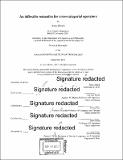An inflexible semantics for cross-categorial operators
Author(s)
Hirsch, Aron, Ph. D. Massachusetts Institute of Technology
DownloadFull printable version (37.37Mb)
Other Contributors
Massachusetts Institute of Technology. Department of Linguistics and Philosophy.
Advisor
Kai von Fintel, Danny Fox, and Irene Heim.
Terms of use
Metadata
Show full item recordAbstract
This thesis studies operators such as and and only, which occur in a broad range of environments. And, for instance, appears between sentences, intransitive verbs, quantifiers, and so forth. One line of analysis assigns and/only a "cross-categorial" semantics flexible enough to compose with different arguments. This thesis challenges that view, pursuing the "Semantic Inflexibility Hypothesis" (SIH). Regardless of the surface string, and and only uniformly operate on a meaning characteristic of a sentence -- a truth-value or proposition. The thesis presents four case studies testing a central prediction of the SIH: that when and/only appear to compose with an expression having a non-sentential meaning, there must be covert syntax underlying to furnish an appropriate scope site. Most of the cases involve object DPs: (a) apparent object DP conjunction in basic sentences (John saw every student and every professor) and (b) in pseudo-clefts (What Obama approved was this bill and that bill), along with (c) only preceding an object DP (John learned only one language). The additional case study examines coordination of questions. Novel diagnostics reveal covert syntax in each case, reconciling the data with the SIH -- and, in some cases, leading to a new perspective on the construction. In addition to showing that a range of data may be parsed with covert syntax, I present reason to question whether cross-categorial meanings are available at all. Specifically, I point out that crosscategorial analyses over-generate. First: the mechanisms which give rise to cross-categorial meanings are too powerful, and predict more operators to be cross-categorial than actually are. Second, I show that if and itself were cross-categorial, unattested scope readings would derive. If there are no crosscategorial operators, the over-generation problems resolve without new constraints.
Description
Thesis: Ph. D., Massachusetts Institute of Technology, Department of Linguistics and Philosophy, 2017. Cataloged from PDF version of thesis. Includes bibliographical references (pages 305-323).
Date issued
2017Department
Massachusetts Institute of Technology. Department of Linguistics and PhilosophyPublisher
Massachusetts Institute of Technology
Keywords
Linguistics and Philosophy.